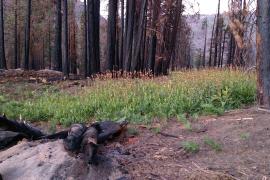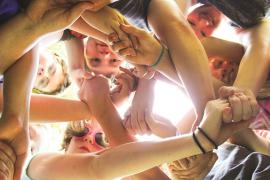Best selling author Ashley Merryman — who has also been tutoring in inner-city Los Angeles for eleven years — recently spoke with ACA about youth development findings in her award-winning book, NurtureShock, which she co-authored with Po Bronson. NurtureShock (now available in paperback) explores child development science that is widely accepted within the scientific community, but that might be yet unknown to youth development professionals. In this interview with Camping Magazine, Merryman talks about praise and self-esteem in children, the value of play, and camp's role in youth development.
Could you talk about praise, self-esteem, and motivation in children and youth?
There's a strong sentiment born out of the self-esteem movement that if we boost kids' self-esteem, they will increase their achievement. The idea is really, "If I tell kids they're terrific all the time, then they'll try new things and do new things and want more because they already have this concept that they're great and can do it."
But researchers like psychologist and Stanford professor Carol Dweck, who has done groundbreaking experiments with students and praise, have actually shown that this is a complete house of cards, and that building self-esteem doesn't actually lead to higher academic achievement. It doesn't lead to any of the good results that we think of in terms of low-risk behavior or anything like that. In fact, high self-esteem for children becomes a disincentive to learn and to improve because if you think you're [already] awesome, why do you need to learn? Why do you need to improve? And moreover, in Dweck's research, she found that telling kids constantly, "You're so smart, you're so talented," actually creates a disincentive for learning. Kids became more likely to cheat and more likely to do the easy task they always knew, rather than try something new that they might learn something from. They become so attached to the label of being smart, being talented, being special, that they don't want to do anything that risks their proving you wrong. So they actually become risk averse.
How should we praise children?
The research is very clear that what we want for kids is to show them that it's about ability and what you put in it. What you get out of it depends on what you put in it, not just the fact that you started out with good genes, or a good background, or whatever. Dweck has done studies with kids in Harlem who were taught a twenty- to forty-five-minute lecture on brain anatomy and were basically told that the brain is like a muscle, and if you learn more, your brain gets bigger and better. And within days of hearing that, kids went from being C- students to being B+ students. They even asked the researchers questions like, "You mean it's up to me if I'm dumb?" So these are really powerful labels in giving kids the feeling that it's up to them and their fate is in their own hands. (Editor's note: For more on Dweck's work, read her book Mindset: The New Psychology of Success.)
In trying to be more open to new experiences, praise of process is important. Which is one of the reasons why Po and I believe camp can be important. Camp can be created as a place where it's okay to make a mistake and it doesn't go on your permanent record. It is a place where you can learn new things and that's okay. But I know from speaking with a lot of camp counselors and directors at some conferences I've been to that even at camp, there's a lot of praise going on, and a lot of awards, and daily recognition for who was the nicest kid in camp. And that's got to stop. Because what you want to do is ask kids, "Did you make a mistake? Okay, did you learn from it? Are you going to do that again?" And have them work that out. The last thing we want to do is replicate the "everyone gets a trophy" environment in camp in the same way that it is in extracurricular activities. We need kids to have room to fail and to understand that you can learn and that making mistakes comes with learning new things — and that it can be hard. But it's part of growing up, and that's okay.
When kids do fail, it can be a hard topic to approach. Do you have any research-informed way that you can handle children's failure?
One thing that is really common is saying, "When I was your age, I did this, too." And it's sort of like saying, "I'm a peer," and "I wasn't perfect," and "I'm your friend." This is actually what most of the researchers say is exactly the wrong response. Because what you're actually doing is conveying the message: "Yeah, yeah, yeah. You thought this was about you, but it's really about me and how I handled things." And it's not about you at that moment; it really is about them. So what you want to do at that moment is say: "Did you learn from this?"; "Why do you think this happened?"; "If you could do it again, how would this be different?" Reassure them that making a mistake is okay as long as you're learning from it. Failing is okay if you learn from it.
The second thing not to do is promise future success. That's the other classic thing to avoid. Don't say, "I know you'll do better next time." You don't have a crystal ball. So, if the child believes you and then she fails again next time, your credibility is shot. There's no reason to listen to you because you promised the child she would do better, and it didn't happen. And it's not about being vapid cheerleaders, it's about being honest, trustworthy people kids can talk to when they have trouble, who can help them understand why they did something wrong and feel safe in that space.
So we should work to make kids resilient?
Resilience and self-efficacy are incredibly important. If you could give a kid anything, you'd give them these traits. In the course of writing our book, Po and I were looking for these super traits that, if you could give them to kids, everything would be okay. We decided there weren't really any super traits, but the closest things we could come to were both resiliency and self-efficacy.
What are the values of creativity and play to children and youth?
For middle schoolers, creative self-efficacy predicts higher college aspirations and higher participation in formal and informal activities after school. There's also some evidence that it can predict more friends for kids. I think that camps could do a lot for developing creative self-efficacy, which is the belief that "I can make things, I can do things." All of those opportunities for kids to do even tangible, small skills are really fantastic and shouldn't be underrated. I think those random craft projects can really matter. It's not just about fine motor skills and letting kids have fun, but a belief that "I can do it" is incredibly important. It's also important to let kids play.
Especially in communities where children are over-scheduled with activities, children get less and less ability to be autonomous, to be self-regulated, because the whole day they've been told, "This is what you're doing." To an extent, camps can allow kids to do different things and decide things on their own and be autonomous. Whether it's just picking one activity versus the other, or even just one part of an activity versus another, even in small ways, it's a new experience for them that could be really valuable.
In the camp community, we often talk about camp as a place where children can learn and grow. Some even call it the "magic of camp." Does camp have the potential to truly be a magical transformative experience for children?
I think it depends on the camp. If the camp is a replication of school days and it's really just a question of geography, then no, nothing is probably going to change. If you're handing out medals or rewards for behavior and you have certain goals, etc., and it's really just a different kind of school, then I don't think it's necessarily going to be that different. It would be the same environment that kids experience every day.
If it's substantively different in terms of the activities that are being done and how things are being addressed, yes, I think there is an opportunity where you can tell campers, "We're going to do things differently and I want you to think about things differently." Give them room to grow, give them room to fail and make mistakes. This is what can make camp magical. And you must tell parents these things as well.
How can the camp experience foster autonomy in campers?
Just not having their parents there, or taking away cell phones so that kids actually have to plan and think — that by itself is probably going to be pretty challenging for some kids in a good way.
And the kid who comes to camp year after year and is bored should be given a new opportunity. He's played the same activities and games for five years. How do you keep him engaged? What you can do is say, "I know you're bored with this. The younger kids need an assistant coach." Give him the opportunity to help other kids. Now it's about learning autonomy; now it's about learning leadership and responsibility. And suddenly that game that he's been playing for five years is a new experience. And that's what's exciting — it's one of the opportunities for autonomy that can happen at camp that may not be happening in the rest of their time, but we still have to let the campers do that too. If camp is completely structured every day and every kid is told, "This is what you're doing today and this is what you're doing tomorrow," then they're on the same scheduling as they are at home and they're not benefitting from camp as much as they could.


